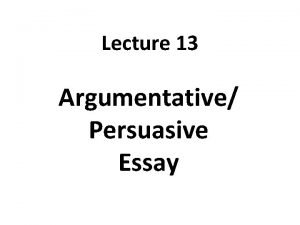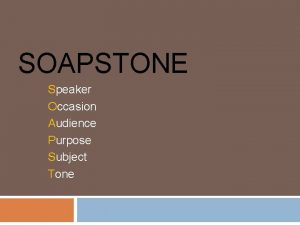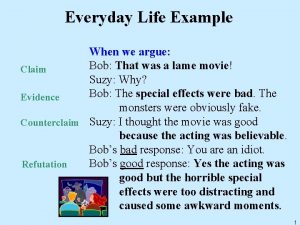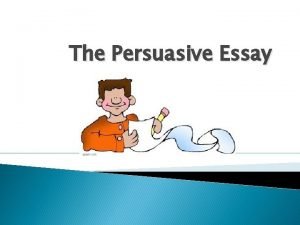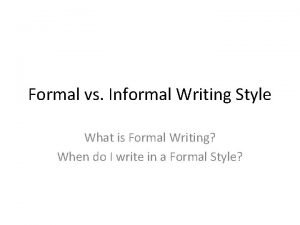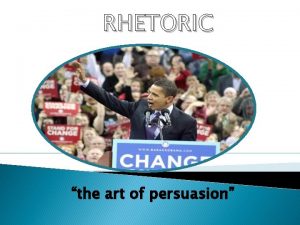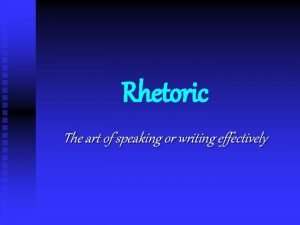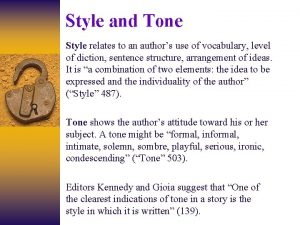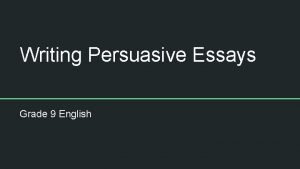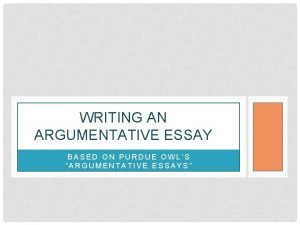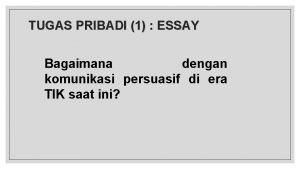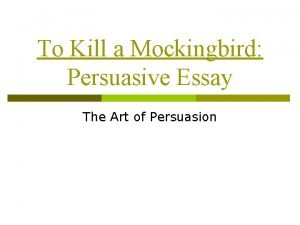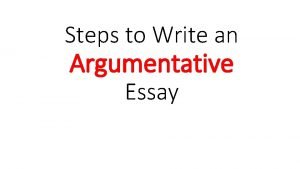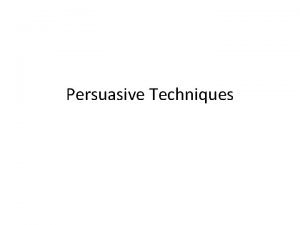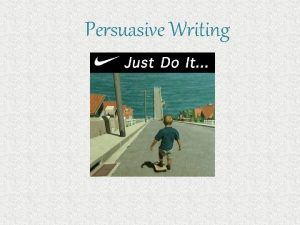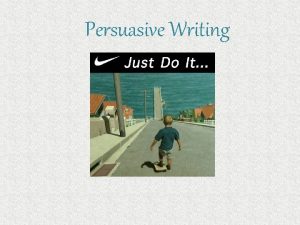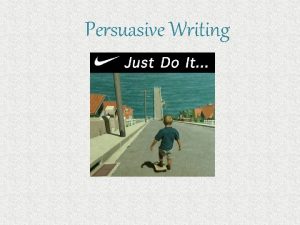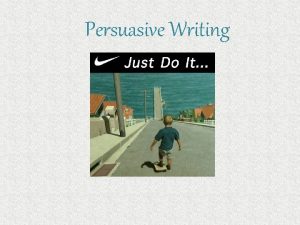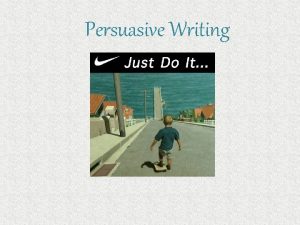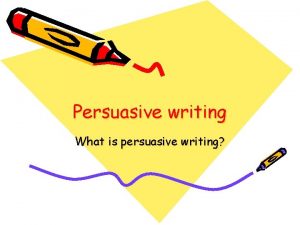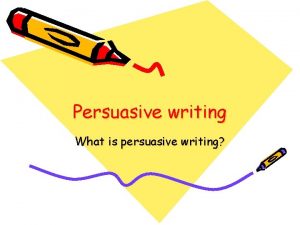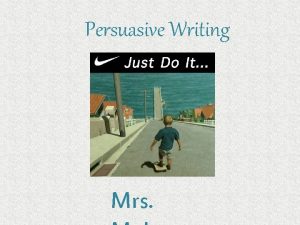Persuasive Essay Audience SupportEvidence Tone and Audience Writing





















- Slides: 21

Persuasive Essay Audience, Support/Evidence

Tone and Audience Writing for an audience

Tone �the overall attitude a writer projects toward the reader and the subject matter.

Formal versus Informal:

Compare the following conversations: Vanessa, your BFF since 6 th grade, wants to know all about your date with Tommy last night. Vanessa: TELL me all about it!! Me: Okay, like, oh my goodness, he showed up with a dozen roses and took me to this bomb restaurant, and we totally hung out at the pier. Vanessa: Shut up!! Me: Serious!

Now at dinner with your grandparents, they somehow found out about Tommy and want to know all about your date: Grandma: How was your date last night, dear? Me: It was delightful, Grandma. Tommy was a gentleman. Grandpa: Of course he would be – only the best for my granddaughter. Me: Tommy took me to Cheesecake Factory and then we went for a walk on the pier.

Different Tones for Different Audiences �Let’s just say you are trying to persuade your audience on the issue of extending the lunch hour from 30 minutes to 45.

If you were writing to your peers… Imagine a school where you can actually spend lunch time hanging out with your friends. You don’t have to waste time fight your way through the crowd, wait in that ridiculous line, and then find out you only have 10 minutes left to scarf down your lunch and catch up on your friends’ lives. Just imagine. Now let’s make it a reality.

If you were writing to Dr. Avina… The advantages to an extended lunch is not only beneficial to the student body, but also profitable for teachers and staff. Many times, students do not have the opportunity to stay after school to meet with counselors or to receive help from teachers. Extending the lunch time will relieve the stress of rushing lunch and also allow extra time for students to seek help academically during

How do these two examples differ? � Imagine a school where you can actually spend lunch time hanging out with your friends. You don’t have to waste time fight your way through the crowd, wait in that ridiculous line, and then find out you only have 10 minutes left to scarf down your lunch and catch up on your friends’ lives. Just imagine. Now let’s make it a reality. The advantages to an extended lunch is not only beneficial to the student body, but also profitable for teachers and staff. Many times, students do not have the opportunity to stay after school to meet with counselors or to receive help from teachers. Extending the lunch time will relieve the stress of rushing lunch and also allow extra time for students to seek help academically during

How do these two examples differ? Choice of words 2. Structure of sentences 3. And knowing your audience and having the right tone toward your audience. 1. a. Your reasons need to appeal to your audience. b. Your modes of persuasion (appealing to your audience’s emotions, logic, or even mention of support of a famous/popular person) targeting your audience

Gather Support for Your Position �You need at least THREE reasons to support your opinion statement. �These reasons explain why you believe your position is correct. �Remember ethos, pathos, logos?

Appeals… �Logical (logos): speak to the readers’ common sense and logic. Logical appeals make sense. �Emotional (pathos): aimed at the readers’ hearts. Emotional appeals speak to emotions such as fear, love, sympathy, and pride. �Ethical: addresses readers’ sense of right and wrong. Ethical appeals also rely on a reader’s belief that the writer is ethical. �How would you include ethos?

Evidence �Provide at least two pieces of evidence to support each of your reasons.

Analogies �Analogies: comparison that show similarities between otherwise unrelated facts or ideas. ◦ Example: We should be as concerned about the garbage problem today as they once were about finding a vaccine for polio.

Anecdotes �Anecdotes: personal examples or stories that illustrate a point. ◦ Example: My grandfather says the forests that once surrounded my hometown have nearly vanished.

Case Studies �Case studies: examples from scientific research ◦ Example: Government studies show that collecting and using recycled materials saves energy.

Commonly accepted beliefs �Commonly accepted beliefs: ideas that most people share. ◦ Example: most people think that garbage is useless and has no value.

Examples �Examples: specific instances or illustrations of a general idea. ◦ Example: For example, recycling could help save some of the fifty thousand trees that are sacrificed every week to produce Sunday newspapers in the U. S.

Expert Opinions �Expert opinions: statements made by a recognized authority on the subject ◦ Example: Brenda Platt of the Institute of Local Self-Reliance says, “Studies have concluded that recycling costs less than traditional garbage collection and disposal…”

Facts �Facts: statements that can be proven true; some facts are in the form of statistics, or numerical information. ◦ Example: Garbage usually goes into landfills. Of the garbage produced each year in the U. S. , 42% is paper.
 Persuasive vs argumentative
Persuasive vs argumentative Argumentative essay vs persuasive
Argumentative essay vs persuasive Occasion of a text
Occasion of a text Falling intonation examples
Falling intonation examples Audience addressed audience invoked
Audience addressed audience invoked Occasion soapstone example
Occasion soapstone example Differences between persuasive and argumentative writing
Differences between persuasive and argumentative writing Introductory paragraph for persuasive essay
Introductory paragraph for persuasive essay What is formal style
What is formal style Informal tone
Informal tone Rhetoric: the art of persuasive writing and public speaking
Rhetoric: the art of persuasive writing and public speaking Define a business letter
Define a business letter Dos and don'ts of persuasive writing
Dos and don'ts of persuasive writing The art of speaking or writing effectively is
The art of speaking or writing effectively is Identifying tone and style
Identifying tone and style Grade 9 persuasive writing example
Grade 9 persuasive writing example Owl argumentative essay
Owl argumentative essay Persuasive communication essay example
Persuasive communication essay example To kill a mockingbird persuasive essay
To kill a mockingbird persuasive essay Persuasive essay sentence starters
Persuasive essay sentence starters Purpose of argumentative writing
Purpose of argumentative writing Persuasive techniques repetition
Persuasive techniques repetition
